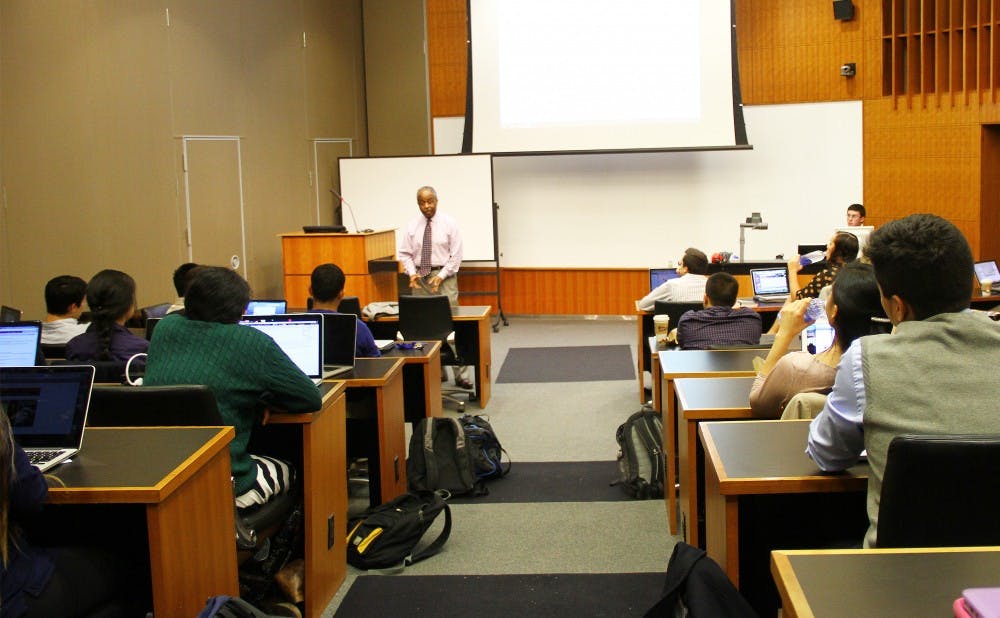More than half of the Duke Student Government Senate this year was appointed by the DSG Executive Board, rather than being elected by the student body.
The senate consists of 60 representatives who advocate for students in the larger context of the University, plus seven elected vice president positions. Each year, additional senators are selected by the DSG Executive Board to fill at-large positions. The appointed senators have the same powers and responsibilities as elected senators, said Executive Vice President Nikolai Doytchinov, and this year, 37 out of 60 were appointed. He explained that this disparity may have been caused by too few upperclassmen running for the position and students deciding to study abroad.
“The student body should be a little disappointed that more upperclassmen haven't run for office, and students who would like to get involved should strongly consider running,” said Doytchinov, a junior.
Student-elected senators are preferred by the executive board but student interest is the most important factor in determining a student’s place in the senate, said newly-elected Executive Vice President Abhi Sanka, a sophomore.
“We ideally would love to have elected senators instead of appointed senators, but if we have people who are eager and willing to work on projects and policy ideas then we’ll take them through the at-large process,” Sanka said.
The problem, Sanka noted, is that the senator position does not have enough responsibility and autonomy. Sanka explained that students would be more likely to run for a senate position if they had more resources to affect change on campus and pursue projects. As next year’s executive vice president, Sanka plans to strengthen the senator position and ensure that senators are aware of the resources available to them.
“Part of this is simply educating them of the resources we already provide, part of it is empowering them with greater sense of responsibility and ownership over their projects by giving senators greater access to administrators,” Sanka said.
Freshman Betty Chen, an at-large senator, defended the at-large process. She said the application and interview process for selection is rigorous, adding that the executive board ensures that students selected to the senate are invested in the position.
DSG President and senior Stefani Jones noted that senators typically drop out due to other time-consuming activities and study abroad, but this year is atypical with the large number of students who withdrew from their positions mid-semester.
Sophomore Craig Vincent said he decided to withdraw from his senate position in February because he had a class conflict with the senate meetings. He felt his time would be best spent advocating rather than legislating for the changes he wanted to see on campus.
"Last Fall outside of the Senate, I started a project to try to change the way UCAE [University Center Activities and Events] disburses money for student groups,” Vincent said. “I decided that I wanted to focus the limited time I had in advocating for those changes and other special projects.”
According to the DSG Consitution, at least 50 percent of the senate, referred to as “quorum,” must be present at a senate meeting in order for legislation to be passed.
Doytchinov noted that senator absences can halt DSG initiatives and budgeting, which in effect can limit the senate’s ability to represent the student body.
“If we were to fail to make quorum, this would be a huge problem, as time-sensitive legislation—including budgeting—would grind to a halt,” Doytchinov said. “But the problem is broader. When senators skip, DSG loses its input, and constituents lose representation.”
Doytchinov said five to 10 senators miss each meeting, but more senators than usual have been missing the senate meetings this semester.
“This [absenteeism] may be in part because of senators' greek life obligations and in part because I've not been as proactive with enforcement,” Doytchinov said.
Get The Chronicle straight to your inbox
Signup for our weekly newsletter. Cancel at any time.

